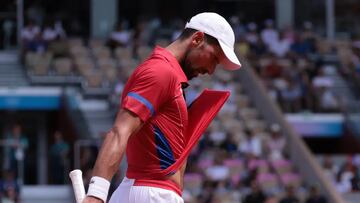Why won’t Djokovic compete after the Olympic Games? Will he play the US Open?
The Serb, who’s looking to finally win the gold medal in the men’s singles Olympic event, confirmed he will take a break after the Games.

Novak Djokovic confirmed his decision to withdraw from the ATP Masters 1000 in Montreal, which will be held between August 6 and 12, once his participation in the Olympic Games ends.
The world No. 2 is looking to win the only big trophy he hasn’t won in his professional career, the men’s singles Olympic tournament’s gold medal.
The Serb came close to achieving that goal in the Beijing 2008 Olympics when he clinched the bronze in a tournament where Rafa Nadal won the gold medal. After not being able to go all the way in the next three editions -defeated by Juan Martin Del Potro in the following two consecutive Games, and Alexander Zverev in Tokyo-, the 24-time major champion wants to finally lift the title he has been waiting for his whole career.
At 37, he knows this will be his last chance to try to reach Olympic glory, although he will have to deal with top players like Carlos Alcaraz, Stefanos Tsitsipas, or Alexander Zverev.
Novak Djokovic has withdrawn from the National Bank Open in Montreal, Tennis Canada announced. pic.twitter.com/V4Iw7xnWZh
— Sportsnet (@Sportsnet) July 29, 2024
Why won’t Novak Djokovic play after the Olympics?
Contrary to what many expected, ‘Nole’ won’t keep playing after the Games conclude. Djokovic, who has been dealing with some fitness issues and had to undergo surgery after the French Open, needs to take care of his knee and not overcharge it with more matches.
That’s the reason why the current US Open champion will skip the ATP Masters 1000 in Montreal (August 6-12), a tournament Djokovic won on four occasions.
Related stories

Matt Richards’ viral reaction after gold medal agony
The Belgrade maestro now seems to be more focused on the biggest events, such as the Grand Slam tournaments, and that’s why his next big challenge will be trying to retain his crown in New York in August.
Djokovic will try to be at his best in the fourth and last major of the season. He will return to competition in the Cincinnati Open (August 12-19), where last year he defeated Alcaraz in one of the best three-set finals in recent history.
Complete your personal details to comment